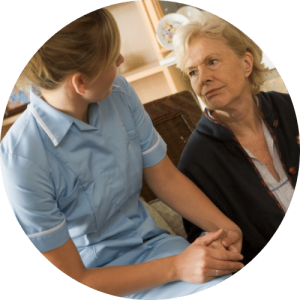
Dehydration in the elderly is a serious health risk. It’s a common cause of hospitalization. Especially during the hot summer months.
As a precaution, most senior living communities have a Hydration Program. Of course, some do a better job than others.
That's why it's important to understand the risk factors, signs of dehydration, and prevention strategies. Then you can assess the program in your loved one's assisted living.
Why are elderly more prone to dehydration?
Assisted living providers understand the risk factors for older adults of becoming dehydrated. You can partner with your mom’s community when you too know what’s involved.
Diminished thirst
As we age our sense of thirst diminishes and we don’t recognize we need fluids. So older adults get severely dehydrated before they even realize they’re thirsty.
Mobility
Frail elders may find it difficult getting out of chairs and recliners. Getting a drink of water doesn’t seem worth the effort.
Overactive bladder and incontinence
Liquid in, liquid out. Many older adults avoid fluids because of incontinence worries. They get tired of frequent and urgent bathroom trips.
Misdiagnosed and undiagnosed
Many early signs of dehydration are easily confused with other medical and natural conditions. Things like dry mouth, fatigue, dizziness, and muscle cramps.
Too many diuretics
Many older adults avoid water and drink a lot of coffee instead. While coffee, tea, and soda are okay in moderation, they shouldn’t be the only fluids consumed.
Medications
Older adults often take several medications. Some of these meds act as diuretics. They may also cause increased sweating leading to dehydration.
Decreased kidney function
Aging bodies have aging kidneys that are less able to conserve fluids.
Illness
Vomiting and/or diarrhea can quickly cause dehydration in the elderly.
What are the signs of dehydration in a elderly?
Caregivers are trained to watch for the following signs of dehydration – especially during hot weather. Collaborate with your dad’s caregivers in keeping him safe by also recognizing the signs.
You can also check an elderly person’s skin for turgor (plumpness of the skin cells). Pull up on the skin on the back of the hand for a few seconds. If it doesn’t return to normal almost immediately, they’re dehydrated.
If you notice these signs in your loved one, call the nurse right away. He or she can assess if your elder should go to the hospital.
What are Hydration Programs in assisted living?

Most assisted living facilities start a Hydration Program during hot weather streaks. These programs prevent dehydration by surrounding residents with opportunities to drink fluids. Here’s what Hydration Programs could include:
Caregiver training
Caregivers should get frequent reminders about symptoms of dehydration. And daily review residents at greater risk – such as loners and those with dementia.
Resident Education
Seniors themselves need education about their risk of dehydration. They should be encouraged to drink, even when they don’t feel thirsty. Urge them to keep several water bottles around: by the bed, easy chair, or dining table. Kick off a Hydration Program with special branded water bottles.
Body weight monitoring
Elders can lose 2-4 pounds of water weight when they’re dehydrated. Daily weight monitoring is critical for folks with renal failure and cardiac issues.
Mealtime choices
Staff should routinely serve water and juices at every meal. Along with encouragement and reminders. Soups should regularly be on the menu. Also, meals should include a wide variety of fresh fruits and vegetables.
Social hours
Activity directors can include popsicles, fruit infused water, and fresh melons at all social gatherings. They can place water stations throughout the building. Especially in areas where residents naturally gather. Meanwhile, encourage your loved one to attend events.
How can you partner with your parent's assisted living?

In case you're rating the Hydration Program at your parent's facility, a high score would include all the above. But keep in mind, your parent’s facility might not need all the above. Every community is different – every mix of residents is different.
Over all, what do you think? Is your facility doing a great job? Wonderful! Be sure to compliment the staff and say, “Thank you.”
On the other hand, could the program use a little boost?
First, encourage your own loved one. Make sure they have plenty of water bottles.
Second, talk to the administrator and ask about their program. They may be doing things you don’t see. Check the Activities Calendar.
Third, ask how you can best help. Perhaps you could volunteer to join the social hours and help serve refreshments.
In conclusion
Keeping our elders healthy and safe is a team effort. It takes collaboration of family advocates and their loved one's assisted living.
The best outcome for your elderly family member is to know about dehydration. Especially the added risks for elderly. Know the signs of dehydration and some prevention strategies.
Leave a comment below. Tell us how you partner with your assisted living community.
You might also be interested in these articles:

5 Ways assisted livings prevent dehydration in elderly residents
Dehydration in the elderly is a serious health risk. It’s a common cause of hospitalization. Especially during the hot summer